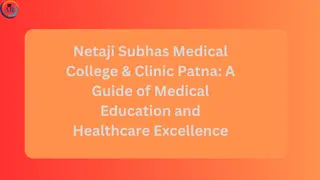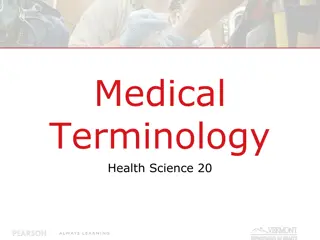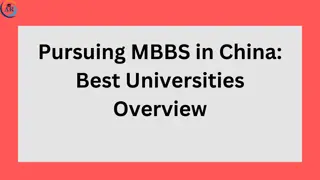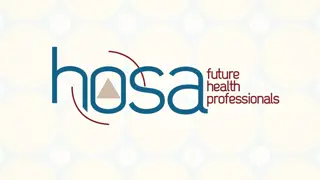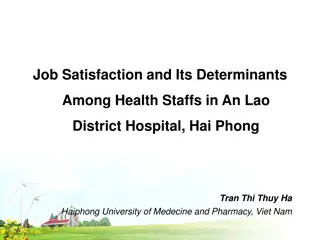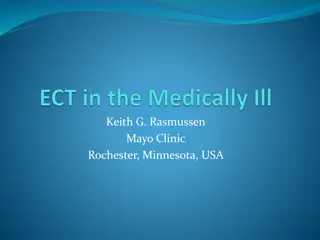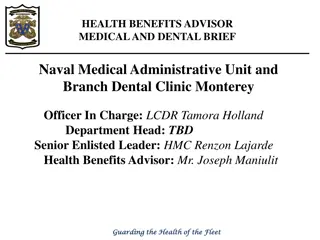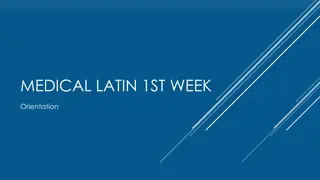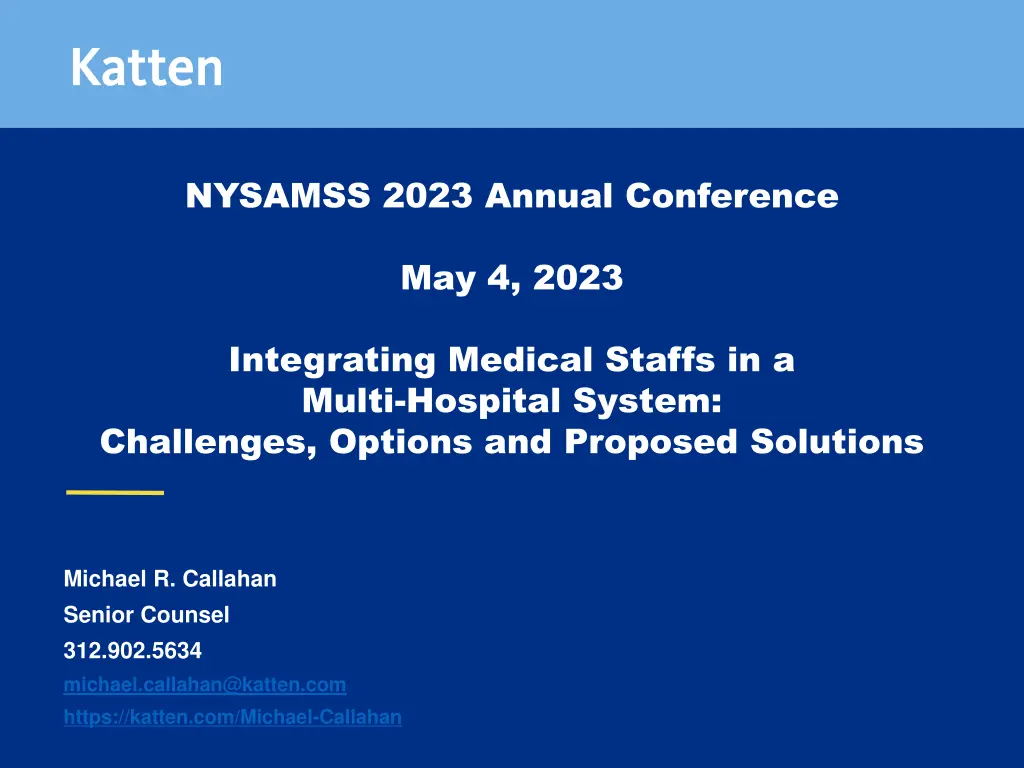
Integrating Medical Staffs in Multi-Hospital Systems
Explore the challenges, options, and proposed solutions for integrating medical staffs in a multi-hospital system. Learn about factors leading to mergers, acquisitions, and affiliations, common medical staff leadership structures, legal standards, and more. Discover the benefits, as well as the challenges of unification, and how to navigate through them effectively.
Uploaded on | 1 Views
Download Presentation

Please find below an Image/Link to download the presentation.
The content on the website is provided AS IS for your information and personal use only. It may not be sold, licensed, or shared on other websites without obtaining consent from the author. If you encounter any issues during the download, it is possible that the publisher has removed the file from their server.
You are allowed to download the files provided on this website for personal or commercial use, subject to the condition that they are used lawfully. All files are the property of their respective owners.
The content on the website is provided AS IS for your information and personal use only. It may not be sold, licensed, or shared on other websites without obtaining consent from the author.
E N D
Presentation Transcript
NYSAMSS 2023 Annual Conference May 4, 2023 Integrating Medical Staffs in a Multi-Hospital System: Challenges, Options and Proposed Solutions Michael R. Callahan Senior Counsel 312.902.5634 michael.callahan@katten.com https://katten.com/Michael-Callahan
Environmental Overview Factors leading to mergers, acquisitions and affiliations Increased competition Access to capital Declining reimbursement Higher labor costs and operating expenses Movement from volume to value as a basis of reimbursement Efforts to improve efficiencies, quality of services and reduce costs Greater market leverage Benefits to medical staff integration Uniform and standardized medical staff bylaws, rules, regulations and policies Single appointment and reappointment process Standardized peer review and fair hearing procedures Uniform credentialing and privileging criteria Katten Muchin Rosenman LLP | Confidential & Proprietary 2
Environmental Overview Common Medical Staff leadership structure Uniform policy on restricting access to competing physicians Improving quality and continuity of health care services through adoption and standardized quality metrics and outcome standards More uniform physician compensation and contract standards Greater ability to share physician peer review and quality outcome data by and between affiliated hospitals and facilities More effective on boarding for managed care contracting Better able to maximize state and federal peer review privileged protections Katten Muchin Rosenman LLP | Confidential & Proprietary 3
Challenges, Options and Proposed Solutions Single Unified Medical Staff Applicable Legal Standards Medicare Conditions of Participation 42 CFR Sections 482.12, 482.22 Accreditation standards MS.01.01.01, EP 37 State and local laws Pros Uniform appointment, reappointment and hearing process across the system for all physicians Uniform policies and procedures Can be implemented by region/division Amendment process for bylaws, rules, regulations and policies is more streamlined Must follow Medicare CoPs and state laws regarding which professionals can serve on the Medical Staff Katten Muchin Rosenman LLP | Confidential & Proprietary 4
Challenges, Options and Proposed Solutions Cons Disparate cultures, Medical Staff profiles (employed versus independent), geography, etc., make the effort to unify more difficult to accomplish How do you choose the best model set of bylaws and policies? Amendment process to achieve single unified staff is detailed and success of obtaining approval is uncertain Must take into account different state statutory requirements if part of a multi-state system will state approve a single staff? Must follow Medicare CoPs and state laws regarding which professionals can serve on the Medical Staff Can only have a common parent board and not separate hospital boards. Potential for unraveling must give Medical Staffs the ability to opt- out. Katten Muchin Rosenman LLP | Confidential & Proprietary 5
Challenges, Options and Proposed Solutions Alternatives Adopt common or uniform forms and provisions such as the pre- application, appointment, reappointment and hearing procedures but maintain committee and Medical Staff leadership structure Create a CVO Create centralized credentials committee for the system or by region Adopt a uniform pre-screening application Adopt same bylaws, with appropriate variations, but with different cover sheets Adopt a uniform access policy to prevent competing physicians from obtaining and maintaining membership and clinical privileges Significantly Different Medical Staff Bylaws, Rules and Regulations Applicable Legal Standards State Hospital Licensing Act Katten Muchin Rosenman LLP | Confidential & Proprietary 6
Challenges, Options and Proposed Solutions Accreditation Standards Medicare Conditions of Participation Pros Differences reflect disparate cultures, geography and historical nuances helps to keep the peace For multi-state systems, bylaws reflect different state standards for compliance, peer review, licensure and Medical Staff eligibility standards Hospitals could be under different accreditation standards although all must comply with CoPs Bylaws and regulations are likely to be less uniform if system is composed of academic medical centers, suburban, rural and critical access hospitals one size does not fill all Katten Muchin Rosenman LLP | Confidential & Proprietary 7
Challenges, Options and Proposed Solutions Cons Can serve as an impediment to future consolidation, collaboration and efficiencies Conflicting FPPE, OPPE, peer review and related standards and eligibility criteria and requirements undermine efforts to upgrade and maintain quality of the Medical Staff and can increase negligent credentialing and malpractice liability exposure Some bylaws could be out of compliance with Medicare CoPs, as well as accreditation and statutory requirements Efforts to adopt uniform provisions can be difficult at best and time consuming How is an investigation defined in the Bylaws for Data Bank reporting purposes versus routine peer review? Different standards for what does and does not trigger a hearing Different staff categories with potential loss of certain membership rights Katten Muchin Rosenman LLP | Confidential & Proprietary 8
Challenges, Options and Proposed Solutions Alternatives Conduct a compliance audit in order to determine whether there are regulatory compliance gaps If seeking to adopt some uniform provisions do a comparison check to see how similar or different are the existing bylaws and regulations Pre-screening policies may be more easily adopted depending on whether the hospital or the Medical Staff controls the process Seek common ground on less controversial provisions such as the appointment/reappointment and fair hearing procedures Try to sync up appointment/reappointment procedures and schedules Create system/region/Bylaw Committee with appropriate Medical Staff representation Streamline Bylaws and move sections to manuals or plans, i.e., Credentialing Manual, Fair Hearing Plan, in order to implement a more expedited amendment process Katten Muchin Rosenman LLP | Confidential & Proprietary 9
Challenges, Options and Proposed Solutions Conflicting Credentialing/Privileging/Eligibility Criteria Applicable Legal Standards Hospital Licensing Acts Standard of care issues Accreditation standards Medicare Conditions of Participation Pros Allows for diversity of members and categories Maintaining differences avoids the need to terminate clinical privileges or provide hearing rights if the physician would no longer be eligible and therefore would lose privileges Privileges do need to be site specific and depends on the nature of clinical services offered by the hospital Katten Muchin Rosenman LLP | Confidential & Proprietary 10
Challenges, Options and Proposed Solutions Cons Can result in alleged breaches of standard of care depending on the degree of differences as reflected in department criteria and policies such as use or non-use of core privileges and different eligibility standards Could be granting privileges to competitors at one facility who would be prohibited from obtaining membership at an affiliated hospital depending on pre-screening standards Relying on utilization/quality standards to demonstrate current competency at some but not all facilities Lack of uniform adoption of required quality metric/outcome standards imposed by ACOs, private payers, etc. has a direct impact on a hospital s reimbursement Are FPPE/OPPE standards different? Do they even exist? Conflicting Code of Conduct/Disruptive Behavior Physician Wellness Policies Required versus permissive use of hospitalists Katten Muchin Rosenman LLP | Confidential & Proprietary 11
Challenges, Options and Proposed Solutions Alternatives You need to conduct a comprehensive analysis to determine the degree of differences in criteria and potential resulting liability exposure and adverse impact on reimbursement You need to evolve towards common eligibility standards You need to examine impact on a physician s existing privileges - who wins and who loses and if hearing rights are triggered Is there a legitimate basis to grandfather physicians? Allow 12-24 months to meet criteria. If not met then privileges are voluntarily relinquished with no Data Bank reporting obligations During interim period closely monitor outcomes where standards are lower or not as demanding Reduce or eliminate volume standards for eligibility and look to other loyalty factors, i.e., serving under-served patent populations, treating indigent care/Medicaid patients, service on committees Consider membership only category Katten Muchin Rosenman LLP | Confidential & Proprietary 12
Challenges, Options and Proposed Solutions Use multi-disciplinary group to evaluate and identify common standards Amend bylaws and policies accordingly Conflicting Privilege and Immunity Statutes and Existing Policies Applicable Legal Standards State peer review and immunity statutes Patient Safety and Quality Improvement Act of 2005 HCQIA Applicable case law Pros Assumption is that each hospital in a multi-state system has modified its bylaws and policies to maximize these privilege and immunity protections to apply in state and/or federal proceedings and investigations Katten Muchin Rosenman LLP | Confidential & Proprietary 13
Challenges, Options and Proposed Solutions Combined privileges maybe broader than a single privilege The more the merrier Cons Tracking changes in state peer review statutes and applicable case law for multi-state systems is not easily accomplished and could lead to different bylaws, policies, and practices. What information is privileged and what actions are eligible for immunity protections will differ Waiver issues also vary especially if sharing confidential information across state lines and even within the system depending on the categories of providers which can access the protections Also, in the context of CINs/ACOs the scope of activities and provider facilities that are covered are different and may not be available at all Conflicting peer review policies and procedures forms will impact the scope of privilege and immunity protections and liability exposure Katten Muchin Rosenman LLP | Confidential & Proprietary 14
Challenges, Options and Proposed Solutions Alternatives HCQIA immunity protections have been adopted by most states thereby giving the system a base level of immunity protections Both state and HCQIA immunity protections could apply depending on the facts and circumstances of the dispute in question and whether you are in compliance with the immunity requirements Keep in mind that attorney-client and insurer/insured privileges may be separately applicable Consider participating in a patient safety organization ("PSO") under the Patient Safety and Quality Improvement Act of 2005 Scope of privileged activities under the Patient Safety Act are typically broader than activities under state privilege protections Patient Safety Act (PSA") privilege applies to all licensed facilities in the state Privileged information can be freely shared among affiliated providers throughout the system Katten Muchin Rosenman LLP | Confidential & Proprietary 15
Challenges, Options and Proposed Solutions Privilege protections apply in all state and federal proceedings whereas state peer review statute will only apply in state court and state causes of action, i.e., defamation and breach of contract, but not in federal court for federal actions such as in discrimination or antitrust claims PSA allows a non-provider corporate parent to be considered a provider and to be part of a single system patient safety evaluation system thereby enabling it to access the privilege protections Privilege can never be waived under any circumstance Economic Credentialing Issues - Background Hospitals are becoming more selective over which physicians can obtain and maintain membership and clinical privileges Systems are developing pre-screening applications which focus on questions of whether an interested physician is employed by a competing group, has a financial interest in a competing facility, or otherwise has significant conflicts of interest these physicians do not get an application decision is not reportable Katten Muchin Rosenman LLP | Confidential & Proprietary 16
Challenges, Options and Proposed Solutions These decisions need to be Board-driven better to base policy on issues such as continuity of care, quality, costs and utilization as well as identified adverse economic impacts affecting the system by granting competitors Medical Staff membership Economic credentialing is legal Applicable Legal Standards Current medical staff bylaws and policies Hospital licensing statutes Antitrust, Anti-Kickback statutes Pros Protects hospital and Medical Staff from loss of referrals and revenue by preventing competing physicians from obtaining and maintaining membership and privileges Can require applicant to participate in ACO/CIN contracting Katten Muchin Rosenman LLP | Confidential & Proprietary 17
Challenges, Options and Proposed Solutions Can require higher eligibility for participating in an ACO/CIN Allows hospital to be more selective and better maintain quality and continuity of care Prevents disclosure of sensitive competitive and strategic information Avoids unnecessary patient transfers to competing hospitals and facilities A pre-screening application form is typically used Cons Could lead to legal challenges based on allegations of illegal anti- competitive conduct, discrimination, breach of contract, tortious interference, etc., especially if applied to existing members without some form of hearing Politically difficult to obtain Medical Staff support Requires well documented justification and must be Board driven Katten Muchin Rosenman LLP | Confidential & Proprietary 18
Challenges, Options and Proposed Solutions If the Medical Staff controls the pre-application, application and reappointment forms it may be difficult to include economic screening questions Amending bylaws to authorize adoption of these standards probably more difficult especially as applied to existing Medical Staff members Alternatives Should evaluate pre-screening, pre-application forms and applications to see what questions are being asked and then modify Best practice is to develop standard forms and conflict of interest policies across the system which can be used to prohibit competing physicians from serving on the Board or in Medical Staff leadership positions Conflict of interest policies should ask whether the physician not only has economic interests or a relationship with competing facilities, but also whether they serve in leadership positions and/or have contractual relationships with competing hospitals Katten Muchin Rosenman LLP | Confidential & Proprietary 19
Challenges, Options and Proposed Solutions Some systems actually have applied these restrictions to existing Medical Staff members such that they will not be reappointed if these competing economic interests continue to exist Ideally, an effort should be made to incorporate the Board policy and standards and these appointment and reappointment restrictions into the Medical Staff bylaws, although such an effort is likely to be difficult Impact on Existing and Different Exclusive Contracts Applicable Legal Standards Current exclusive contracts Anti-Kickback and statutes IRS employment standards Katten Muchin Rosenman LLP | Confidential & Proprietary 20
Challenges, Options and Proposed Solutions Pros Maintaining existing exclusive contracts that have been in effect for some period of time can help to maintain continuity of quality health services given the familiarity that the group has with the hospital and supporting personnel, use of equipment and other benefits derived from these arrangements Maintaining the groups could help to retain referral relationships between the hospital and its existing Medical Staff Some existing groups may already be staffing more than one system hospital changing groups could be significantly disruptive Cons Different exclusive groups could have conflicting contract terms is there a clean sweep provision whereby hearing rights are waived? Quality results and standards of care could vary Are all the groups required to participate in MCO arrangements? Katten Muchin Rosenman LLP | Confidential & Proprietary 21
Challenges, Options and Proposed Solutions Differences between groups that are employed versus under contract and impact on apparent agency liability claims Recruitment problems Are some groups protected and state/federal privilege statutes and others are not? Some groups may require a subsidy due to Medicaid indigent care populations whereas other do not Alternatives Group mergers by region RFPs between existing and/or outside groups Work toward standardized agreements/requirements Impact on Existing and Different Physician Contracts Applicable Legal Standards Existing contracts Katten Muchin Rosenman LLP | Confidential & Proprietary 22
Challenges, Options and Proposed Solutions IRS compensation standards Anti-Kickback and Statutes Example Physician Contracts Employment Medical Director Medical Staff leadership positions ED coverage Specialized service contracts Loan/support agreement Recruitment agreements Pros Leaving existing contracts in place will maintain continuity of services resulting in less disruption at least during transition period Katten Muchin Rosenman LLP | Confidential & Proprietary 23
Challenges, Options and Proposed Solutions Allows system to better evaluate performance of providers pending a decision on whether to maintain, terminate or consolidate services Helps to maintain existing referral and other relationships with the hospital and Medical Staff Cons Conflicting responsibilities and lack of standardized compensation arrangements Stuck with long term commitment and difficulties in achieving amendments Agreements may be violative of IRS, Anti-Kickback and Start standards Employed v. unemployed Medical Staff officers and leaders Breach of contract, tortious interference and other claims if agreements are terminated or not renewed Potential loss of loyal and referring physicians Katten Muchin Rosenman LLP | Confidential & Proprietary 24
Challenges, Options and Proposed Solutions Alternatives Need to inventory all contracts of incoming physicians to determine scope of conflicts and issues noted above Reasonable efforts to standardize contract terms at all levels should be the goal Need to consider a transition period for all unless inventory identifies serious legal and related liability issues Efforts to integrate and collaborate can be assessed during interim period Impact on Existing Medical Staff Officer, Department and other Leadership Positions Applicable Legal Standards Existing Bylaws, Rules and Regulations Katten Muchin Rosenman LLP | Confidential & Proprietary 25
Challenges, Options and Proposed Solutions Accreditation standards Hospital Licensing Acts Pros Maintaining current leadership structure during a transition period is critical to maintaining Medical Staff support and avoiding desertions due to perceived or actual loss or diminishment of independence Transaction plan may have already been developed and shared with Medical Staff leadership in advance of merger/affiliation Cons Conflicting or different responsibilities and eligibility standards Determining who has primary responsibility and if conditioned on system or system Medical Staff leadership or committee approval Has a limiting effect on efforts to integrate Used as a way to protect less qualified or non-qualified Medical Staff members Katten Muchin Rosenman LLP | Confidential & Proprietary 26
Challenges, Options and Proposed Solutions Alternatives Need a transition game plan which evaluates which leadership changes can be more easily accomplished If the system has moved to system-wide departments then consider appointing current Department/Section Chairs in the merged hospital as Vice Chairs Katten Muchin Rosenman LLP | Confidential & Proprietary 27
Firm Bio Firm Bio A nationally recognized advisor to health care providers across the country, Michael Callahan provides deeply informed business and legal counseling in all areas of hospital-physician relations and health care regulatory compliance and governmental investigations, including the Emergency Medical Treatment and Active Labor Act (EMTALA), the Health Insurance Portability and Accountability Act (HIPAA), Medicare Conditions of Participation (CoPs), hospital licensure and accreditation standards. He is widely respected for his leading work on the Patient Safety Act from a regulatory compliance, policy and litigation standpoint, including the development of patient safety organizations (PSOs). The knowledge to identify efficient and practical solutions The knowledge to identify efficient and practical solutions Health systems, hospitals and physician groups large and small across the country come to Michael for practical, real-world guidance and answers to challenging legal and operational issues, which he can provide quickly because of his many years of experience. He understands the reality of hospital quality, peer review, risk management and related operational legal and regulatory complexities and can rely on a large client base in order to provide better and comparative solutions. Michael R. Callahan Michael R. Callahan Senior Counsel Senior Counsel Health Care He also is sought out by many of the largest health systems around the country for his understanding and interpretation of the Patient Safety Act. In a case of first impression he advised a national pharmacy that became the first provider to successfully assert an evidentiary privilege under the Patient Safety Act. Since that case, he has represented or advised many hospitals, physician groups and other licensed providers in creating or contracting with federally certified PSOs and has been directly involved in most of the major state appellate and federal court decisions interpreting the Patient Safety Act. Chicago Office +1.312.902.5634 michael.callahan@katten.com https://katten.com/Michael-Callahan Katten Muchin Rosenman LLP | Confidential & Proprietary 28
Katten Locations CHARLOTTE 550 South Tryon Street Suite 2900 Charlotte, NC 28202-4213 +1.704.444.2000 tel +1.704.444.2050 fax LONDON Paternoster House 65 St Paul s Churchyard London EC4M 8AB United Kingdom +44 (0) 20 7776 7620 tel +44 (0) 20 7776 7621 fax NEW YORK 50 Rockefeller Plaza New York, NY 10020-1605 +1.212.940.8800 tel +1.212.940.8776 fax WASHINGTON, DC 2900 K Street NW North Tower - Suite 200 Washington, DC 20007-5118 +1.202.625.3500 tel +1.202.298.7570 fax CHICAGO 525 West Monroe Street Chicago, IL 60661-3693 +1.312.902.5200 tel +1.312.902.1061 fax LOS ANGELES CENTURY CITY 2029 Century Park East Suite 2600 Los Angeles, CA 90067-3012 +1.310.788.4400 tel +1.310.788.4471 fax ORANGE COUNTY 100 Spectrum Center Drive Suite 1050 Irvine, CA 92618-4960 +1.714.966.6819 tel +1.714.966.6821 fax DALLAS 2121 North Pearl Street Suite 1100 Dallas, TX 75201-2591 +1.214.765.3600 tel +1.214.765.3602 fax LOS ANGELES DOWNTOWN 515 South Flower Street Suite 4150 Los Angeles, CA 90071-2212 +1.213.443.9000 tel +1.213.443.9001 fax SHANGHAI Suite 4906 Wheelock Square 1717 Nanjing Road West Shanghai 200040 P.R. China +86.21.6039.3222 tel +86.21.6039.3223 fax Katten refers to Katten Muchin Rosenman LLP and the affiliated partnership as explained at katten.com/disclaimer. Attorney advertising. Published as a source of information only. The material contained herein is not to be construed as legal advice or opinion. Katten Muchin Rosenman LLP | Confidential & Proprietary 29


